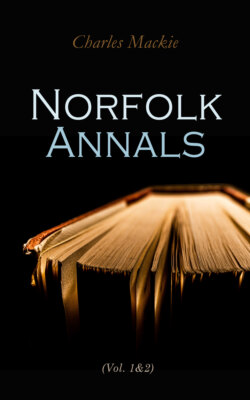Читать книгу Norfolk Annals (Vol. 1&2) - Charles Mackie - Страница 161
На сайте Литреса книга снята с продажи.
JANUARY.
Оглавление2.—Polito’s menagerie was exhibited on the Castle Ditches, Norwich.
—*“A smuggling cutter, with 600 casks of Geneva on board, was last week captured off Salthouse by the Sheringham Revenue boat. The vessel was taken to Blakeney harbour, and her cargo deposited in the King’s warehouse, at Cley.”
13.—A Methodist Chapel, erected in Tower Street, King’s Lynn, and estimated to hold 3,000 persons, was opened.
17.—Upwards of 1,000 persons attended evening service at St. Andrew’s Church, Norwich, when the sermon was preached by the Rev. Robert Walpole. This was one of a series of services arranged under a scheme of “evening lectures” by clergymen who had “volunteered to officiate alternately at the churches of St. Stephen, St. Andrew, and St. Lawrence.” The churches were “excellently lighted with lamps,” and the “accommodation of strangers particularly attended to by parish officers and other gentlemen.”
19.—Mr. Steward Alderson, at the Norwich Quarter Sessions, called attention to “a species of nuisance existing in various parts of the town which not only endangered the public peace but also the public health and morals. He referred to the species of houses commonly called gin shops. If the magistrates had signed the licenses of such houses, it was wholly through ignorance of the sort of houses to which they were giving their sanction.”
—At the Duke’s Head Inn, Lynn, a committee of barley growers of the county presented to Mr. Wm. Becher, of Docking, a valuable piece of plate in recognition of his exertions in promoting the success of agriculture, and in opposing injurious restrictions on the corn trade.
25.—Died, aged 45, Mr. William Money Hill, of Waterden, an agriculturist of great repute in the breeding and selection of stock, and the winner of many prizes at the Holkham Sheep Shearings.
—The third great main of cocks between the gentlemen of Norwich and the gentlemen of Cambridge commenced at the White Swan Inn, Norwich, and was continued on the 26th and 27th. The conditions were: to show 41 mains for 10 guineas a battle, and 100 guineas the odd, and ten byes for five guineas a battle. The feeders were Dean for Norwich, Flemon for Cambridgeshire. Cambridge won by five battles.
30.*—“A small farmer, who a few years since resided in the neighbourhood of Norwich, has written from Botany Bay to his former landlord, stating that Cabel, who about 25 years since was sent from Norwich Castle, is now become a very great merchant and the owner of twenty-five ships.” (In the year 1786 Cabel and a female prisoner were in Norwich Castle under sentence of transportation. During the two years that elapsed between the trial and the departure of the first batch of convicts, the woman gave birth to a child. Cabel, the father, was passionately fond of the infant, and appealed to the authorities to allow him to marry the mother. This was refused. The female and her infant were sent with the first contingent of convicts, and after a wearisome journey by coach in the depth of winter arrived at Plymouth in charge of Simpson, the turnkey of the prison. When Simpson handed over his prisoners to the captain of the transport that officer refused to take the child on board, alleging that he had no authority to do so. The mother was distracted by the separation. Simpson acted with great humanity. Taking with him the six weeks old child he proceeded to London by coach, and with much difficulty obtained an interview with the Secretary of State, to whom he related the story. The result was that not only was an order issued for the restoration of the child to its mother, but Cabel was permitted to sail by the same transport to the land of their exile.)
